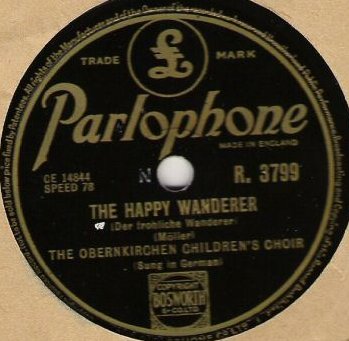The Happy Wanderer
“The Happy Wanderer” (“Der fröhliche Wanderer” or “Mein Vater war ein Wandersmann”) is a popular song. The original text was written by Florenz Friedrich Sigismund (1788-1857). The present tune was composed by Friedrich-Wilhelm Möller shortly after World War II. The work is often mistaken for a German folk song, but it is actually an original composition. His sister Edith Möller conducted a small amateur children’s and youth choir in Schaumburg County, Northern Germany, internationally named Obernkirchen Children’s Choir, in Germany named Schaumburger Märchensänger. She adapted Sigismund’s words for her choir.
In 1953, a BBC radio broadcast of the choir’s winning performance at the Llangollen International Musical Eisteddfod turned the song into an instant hit. On January 22, 1954, the song entered the UK singles chart and stayed on the chart—only a Top 12 at the time—for 26 non-consecutive weeks, peaking at Number 2 (for five consecutive weeks).
With the BBC’s strong international influence “The Happy Wanderer” turned up everywhere, e.g., as the winning song of the 1955 calypso road-march season of the Trinidad Carnival. People protested after this event and complained that only calypsoes should be chosen over foreign music.
Milton DeLugg wrote a noted arrangement, and is sometimes incorrectly credited as the composer of the song.
A number of English-language sources credit Edith Möller and Florenz Siegesmund with writing the words, the implication being (apparently) that they were written at the same time as the tune. However, the German sources all credit the original words to either Friedrich Sigismund, F. Sigismund, or Florenz Friedrich Sigismund[2] and give the dates as either 1788-1857 or early 19th century. All German sources agree that the words to the popular version were adapted by Edith Möller.

